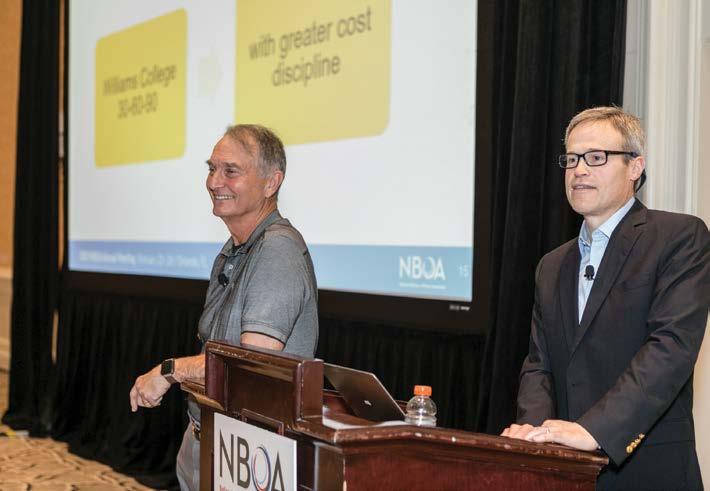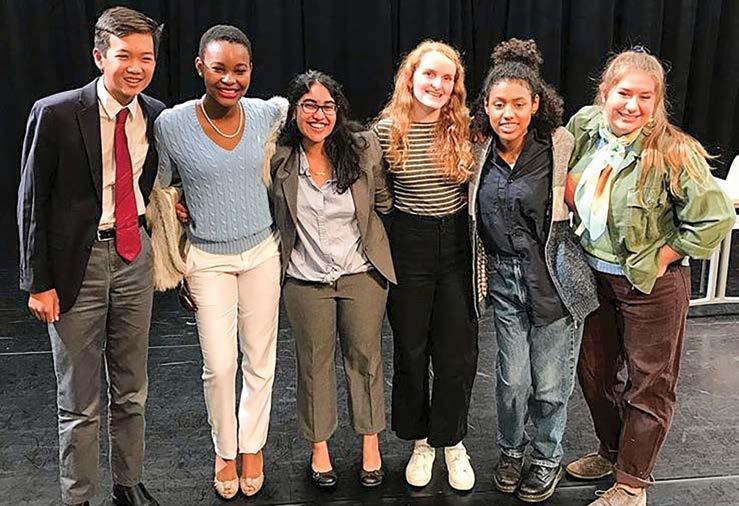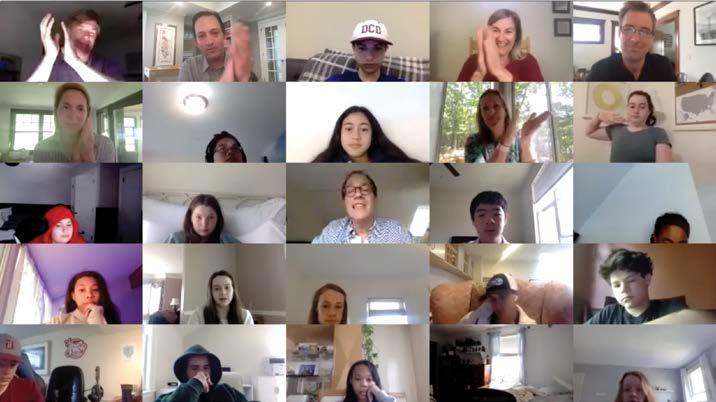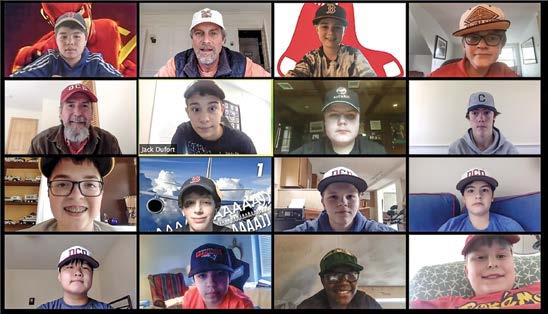
9 minute read
Our Community Coping with Covid
Alumni Working at Mass General During the Worst of the Pandemic
Monique Tello '86
Advertisement
Monique describes her experience during the COVID-19 epidemic working on a surge ward at Massachusetts General Hospital.
Monique Tello ’86, recipient of the 2017 DCD Alumni Award, is a primary-care provider at Women’s Health Associates, a practice of women for women at Massachusetts General Hospital, and a clinical instructor at Harvard Medical School. She is also an author and medical blogger at generallymedicine.com.

I’m just a primary-care doctor, and part-time at that. My focus has been on prevention of disease through healthy diet and lifestyle. But since the coronavirus pandemic hit us in mid-March, I haven’t been able to see my patients in clinic or manage my academic projects. Instead, I’ve been ‘redeployed’ to multiple different jobs on outpatient, urgent care, and even inpatient units of our hospital.
At the beginning of the pandemic, my outpatient clinic all but closed. We were asked to provide ongoing care for our usual patients via video and telephone visits, a completely new concept that involved learning new technology. Our IT department massively mobilized and within a matter of days, we were again scheduling patients, except we were ‘seeing’ them from our homes, often with our kids yelling in the background.
Then, the call for end-of-life discussions went out to us: Given that elderly and medically frail people are clearly more likely to die from this virus, we were asked to reach out to those most at risk and talk to them about it. People should know that they’re at risk, so that they can make the best decisions for themselves, get their affairs in order. We all completed hospital-mandated training sessions covering the medicolegal and psychological issues. Then we made the calls. Some of my patients speak varied languages that I do not, and I utilized our phone interpreter service, adding another layer of complexity, and time. It’s hard enough to try to convey to someone that their chance of meaningful survival from respiratory failure due to COVID-19 is an abysmal single-digit number. Try doing it as a three-way phone conversation in Russian or Vietnamese dialect. Yes, there were many heavy, emotionally draining, logistically complicated but absolutely necessary conversations.
At the same time, I volunteered to work in our pop-up respiratory illness clinics, where we saw people with fevers, coughs, and anything else that might be COVID-19. The first clinic was set up in the emergency department ambulance bay, right as the Biogen conference cases emerged. Testing was extremely limited, and we were still using a brand-new N95 mask for each and every patient encounter, throwing them away after just one use. We learned very early on how to don and doff our Personal Protective Equipment (PPE), what symptoms to ask about, what signs to look for, and most importantly, what to do for a brand-new disease that even infectious disease experts were just learning about.
As the wave of COVID-19 patients came crashing down, and our medical ICUs and floors ran out of space, our hospital opened up more ICUs and more floors. The neuro ICU and several oncology wards became COVID-19 ICUs. Postsurgical and trauma floors became COVID-19 floors. When our hospital put out the request for internal medicine attendings to work on these “surge” wards, I raised my hand. I was anxious, to be sure. It had been twelve years since I managed an inpatient service, and I was worried I wouldn’t know enough.
Despite my worry, working on the surge wards was a positive experience, mostly because of the warm support of my colleagues. Our hospital learned from colleagues in Seattle and New York City: They quickly created and curated a central repository of COVID-19 clinical and logistical resources for us, scheduled recurring ZOOM training presentations, offered shadowing opportunities and established a deep backup system so that they could get docs trained up fast. I threw myself into the learning, but despite the studying, there were still many times that I didn’t know the answers.
This is what I had been afraid of, more than catching COVID- 19, more than dying. It’s every doctor’s fear: That we won’t know what to do, and we’ll do the wrong thing, and hurt someone. We have nightmares about this. But the motto of our hospital has been “Never worry alone”. Everyone has had a positive, helpful, can-do attitude. I have never ever at any point in my medical career witnessed such acceptance and forgiveness of inexperience, of not knowing what to do. “I’ll show you where the PPE is stored/ how to order that test/ how to interpret these labs,” they say instead. “I had to learn too.” Or, almost as commonly, “I don’t know either, let’s go find out.” On the surge wards, I’ve seen OB/GYNs come to the medical floor to give in-person, warm hand-off of a sick postpartum woman; Spanish-speaking orthopedic surgeons rounding with medical teams as interpreters; seven different specialists from all over the hospital join a ZOOM meeting to discuss a mutual patient, on an hour’s notice, at the request of the resident; and many other doctors and nurses like me who haven’t been inpatient for years, even decades, enthusiastically crash-training so they can serve in this time of need.
There’s been sad moments, when we’ve realized that there’s nothing more we can do for a patient, other than alleviate their suffering. And even worse, when we learn that the patient has no friends or family to call. In one case, multiple staff members took turns visiting with the patient, talking to them, stroking their hand, so that they wouldn’t be alone.
One Friday night, I happened to be leaving the hospital around 7:15 pm, after a 12-hour inpatient shift. I walked outside and immediately into the midst of the good Citizens of Boston hanging out of their apartment windows clapping and banging on pots and pans and shaking things and yelling and cheering. I was shocked for a moment, then I realized: They’re doing this for us, recognizing us. I didn’t even know what to say. “Thank you!” yelled one little boy from a balcony nearby. “Well thank YOU!” I waved back, feeling a little silly. After all, I’m just a primary-care doc, and part-time at that.
Mollie White '11
By Leslie Bowen
Mollie never imagined she’d be on the front lines of a global pandemic when she decided to go into nursing back in high school.
Mollie, 23, was assigned to the Blake-12 ICU unit at Mass General, which in early March became dedicated exclusively to COVID-19 patients.
Dealing with the sickest patients is not something normally expected of a new nurse, but one month after she finished her orientation program at Mass General she found herself thrust into an unprecedented situation at one of the nation’s top hospitals.
“It’s scary,” she said. “I’ve been asked to take care of really sick patients as a new nurse. But I have all the support I need. The people I work with are so wonderful and helpful. It’s still stressful but I’m less anxious knowing that I have all these people around me who are so smart and capable.”
New ICU nurses generally ease into the position with the sickest patients being given to more experienced nurses, she explained. But when Blake-12 switched from being a multidisciplinary unit to one dedicated to COVID-19 patients, she found herself taking care of critically ill patients, all of whom were on respirators, all on her own.
She was so concerned about exposing family to the virus, she moved across the street from them. “It’s a relief not having to worry about whether I’m asymptomatic, if I’m going to spread it to them. I can peek across the street and still see them,” she said.
“I always thought I would be a teacher, like my parents,” she said. Mollie’s mother Deb White is a coach and associate admissions director at DCD, and her father, Jon White, is director of admissions at Thayer. “Nursing just connected with my personality,” she said. “You get to know so many people and you’re able to help them when they are their most vulnerable.”
Having two brothers who attended DCD (Traylor “T” ’07 and Ben ’05) and her mother working there created a family experience for Mollie. She left in third grade to attend the Carroll School, and although she didn’t officially graduate from DCD, she said “I did in my heart.”
“I loved my time at DCD. What I take away from DCD, besides my family experience, is that community is so important. That value has really spread out in to my whole life.”
Mollie’s interest in nursing started at Thayer Academy, where she was able to join groups of students and faculty on trips to Haiti, bringing medical supplies and expertise and eventually helping to build a community health center in Saint Rock, Haiti. Traveling to the clinic year after year, she found the work of doctors and nurses so compelling that she started shadowing them back home to find out more about their professions.
With her heart finally set on a career in nursing, she enrolled in Georgetown University’s School of Nursing and Health Sciences, graduating in May 2019 with the Leadership Award from the National Student Nurses’ Association. “I never thought I would go into critical care,” she said, “but I really like the acuity of it, and helping people at their most vulnerable is the epitome of ICU nursing.”
Once back home, she was accepted to a six-month orientation program for new ICU nurses where she worked alongside experienced colleagues and took classes every week that included hands-on experiences and simulations. Finally, after six months she was able to take care of her own patients.
“The orientation taught me not to have expectations, that a patient’s situation can change in a minute,” she said. “I’ve learned to take it minute by minute, constantly reassessing the situation with each patient.”
To take care of herself, she does yoga, goes for walks, and spends time outdoors, does journaling, and colors in an adult-coloring book. “I don’t watch the news or follow social media,” she said, “it’s too stressful. It’s hard to watch what’s going on and also be a part of it.”
Staying away from the news explains why she was continually surprised to hear that a videotaped plea from her Blake- 12 team for the public to stay home, practice social distancing, and donate any extra masks to their local hospitals kept making the news, appearing on a number of major television news outlets, newspapers, and even the Ellen Degeneres Show.
“This situation we’re in is really difficult, but I’ve been so encouraged by how much people have reached out, offering to help and checking on me to see how I’m doing.”

Mollie White ’11, back, right, with fellow nurses on Blake-12 at Mass General after it was converted to a COVID-19 ward.









